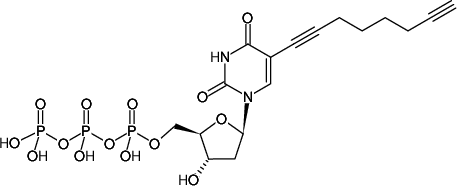C8-Alkyne-dUTP
5-(Octa-1,7-diynyl)-2'-deoxyuridine 5'-triphosphate, Sodium salt
| Catálogo Nº | Apresentação | Preço (R$) | Comprar |
|---|---|---|---|
| CLK-T05-S | 5 μl (100 mM) | Sob demanda | Adicionar ao Carrinho |
| CLK-T05-L | 5 x 5 μl (100 mM) | Sob demanda | Adicionar ao Carrinho |
| CLK-T05-XL | 50 μl (100 mM) | Sob demanda | Adicionar ao Carrinho |

For general laboratory use.
Envio: shipped on gel packs
Condições de armazenamento: store at -20 °C
Short term exposure (up to 1 week cumulative) to ambient temperature possible.
Validade: 12 months after date of delivery
Fórmula molecular: C17H23N2O14P3 (free acid)
Peso molecular: 572.29 g/mol (free acid)
Pureza: ≥ 95 % (HPLC)
Forma: solution in water
Concentração: 100 mM
pH: 7,5
Propriedades espectroscópicas: ε260 nm 3.9 L mmol-1 cm-1 (in water), ε292 nm 11.0 L mmol-1 cm-1 (in water)
Formulários:
Incorporation into DNA by PCR with family B polymerases (Pwo, Deep Vent exo- or KOD XL)[1,2]
Incorporation into DNA by Primer Extension with family A polymerase Taq and family B polymerases (Pwo, Deep Vent exo- or KOD XL)[1]
The resulting ethynyl-functionalized DNA can subsequently be processed via Cu(I)-catalyzed click chemistry that offers the choice
- to introduce a Biotin group (via Azides of Biotin) for subsequent purification tasks
- to introduce fluorescent group (via Azides of fluorescent dyes) for subsequent microscopic imaging
- to crosslink the DNA to Azide-functionalized biomolecules e.g.proteins
Produtos relacionados:
- Copper (II)-Sulphate (CuSO4), #CLK-MI004
- Tris(3-hydroxypropyltriazolylmethyl)amine (THPTA), #CLK-1010
- Sodium Ascorbate (Na-Ascorbate), #CLK-MI005
Referências selecionadas:
[1] Gierlich et al. (2007) Synthesis of Highly Modified DNA by a Combination of PCR with Alkyne-Bearing Triphosphates and Click Chemistry. Chem. Eur. J. 13:9486.
[2] Burley et al. (2006) Directed DNA Metallization. J. Am. Chem. Soc. 128 (5):1398.
[3] Presolski et al. (2011) Copper-Catalyzed Azide-Alkyne Click Chemistry for Bioconjugation. Current Protocols in Chemical Biology 3:153.
[4] Hong et al. (2011) Analysis and Optimization of Copper-Catalyzed Azide-Alkyne Cycloaddition for Bioconjugation. Angew. Chem. Int. Ed. 48:9879.
